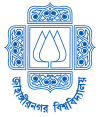
Dr. Md Mujibul Anam Professor, Department of Anthropology
PROFILE
SHORT BIOGRAPHY
Dr. Md Mujibul Anam is a Professor in the Department of Anthropology at Jahangirnagar University, Bangladesh, where he completed both his Bachelor’s and Master’s Degrees in Social Anthropology. He has also completed his MA in Health and Society in South Asia at the Heidelberg University, Germany. Dr. Anam started his career with a Department for International Development funded research program on the Decentralization of Fish Seed Technology. The fieldwork was interdisciplinary and carried out by researchers at Stirling University, Sussex University, UK and the Bangladesh Agricultural University. At the end of the research, he returned to Jahangirnagar as a lecturer on 18 January 2006. Mujibul's area of interest is public health anthropology, social justice, and environment. He has completed his PhD at the Queensland University of Technology, Australia. The title of his PhD research is “Majmawalas and Sexual Health Promotion in Bangladesh: An Ethnography of Street Healers in Dhaka City”. He is a co-author of “Sex, Pornography, and Medicines in the Markets of Dhaka”, in Lenore Manderson (Ed) Technologies of Sexuality, Identity and Sexual Health, London and New York: Routledge.
RESEARCH INTEREST
Public Health Anthropology, Social Justice, and Environment
JOURNAL PAPER
Bourke, L., Mitchell, O., Shaburdin, Z. M., Malatzky, C., Anam, M., & Farmer, J., Building readiness for inclusive practice in mainstream health services: A pre-inclusion framework to deconstruct exclusion., Social Science & Medicine, 289, 2021. doi: 10.1016/j.socscimed.2021.114449Across the globe, people are not equitably included or respected by health services. This results in some people being ‘hardly reached’ and having less access to safe and appropriate care. While some health services have adopted specific agendas to increase inclusion, these services can struggle to implement such strategies because the underlying reasons for exclusion have not been addressed. This calls for preparation prior to implementation of inclusion approaches that deconstructs discourses and practices of exclusion. This paper presents a pre-inclusion framework that seeks to deconstruct exclusion in health services. Authors developed this framework from action research in four ‘mainstream’ regional health services in southeast Australia over five years. Research identified dominant discourses of exclusion among staff in these services. The study also identified common experiences of residents hardly reached by these services. Following, a range of change activities were undertaken within these services to deconstruct exclusion. Researchers also kept journals, reflected on their impact, and identified lessons learned from trying to deconstruct exclusion. Triangulating these analyses, researchers developed an interdisciplinary framework that weaves together Foucauldian theory on power/discourse with continuous quality improvement processes to embed cultural humility and voices of the hardly reached in health care. The framework outlines five foundational concepts (power as productive, deconstruction, use of continuous quality improvement processes, cultural humility and voices of service users), followed by six principles (a journey, expect resistance, whole of service approach, make visible the reasons for change, we are all cultural beings and people centred care) and six actions undertaken within health services (commitment, assessment of exclusion, action plans, structural change, reflective discussions and engagement). Until such approaches to deconstruct exclusion are implemented, inclusive agendas are likely to be ineffective.
Becoming aponjon (the dearest one) Building rapport in a street ethnography on mens sexual health in Dhaka, Bangladesh,
Promoting sexual health is a challenging enterprise in Bangladesh and even more so when official health systems do not recognise existing community resources that might help address some of those challenges. In my doctoral research I set out to understand how majmawalas, street healers, provide a service to heterosexual men who have anxiety about sexual performance and sexual health, and how they might assist in promoting sexual health among men in Bangladesh. I took up this question based on the observation that majmawalas were already providing sexual health information and support to men in Bangladesh (Anam 2010). Together, their skills and their sociocultural positioning enabled them to talk with men about sexual health in a relatively straightforward, nonstigmatising manner, in street spaces that men could access easily both geographically and economically.
When sexuality is in a research topic! The methodological challenges in sexuality and street healing research in Bangladesh.,Special Issue on Fieldwork in South Asia; Guest Edited by Professor Gabriele Alex; V 14, N 1; Publisher: The Oriental Institute of Cultural and Social Research, Allahabad, India; Journal Name: The Oriental Anthropologist: A bi-annual international journal of the science of man; Publication Date: 2014.
BOOK
Peoples' participation in the development projects: debates and research experiences (Bengali), Sex, Pornography and Medicines in the Markets of Dhaka,Book Chapter; Publisher: Routledge; Publication Date: June 2012; Publication Name: Technologies of Sexuality, Identity, and Sexual Health; Edited by Lenore Manderson.
Environment, Political Economics and Livelihood Change,This is a book chapter of the book 'Environment, Migration, and Adaptation: Evidence and Politics of Climate Change in Bangladesh'. The authors of this chapter are Brooke A. Ackerly, Mujibul Anam, and Jonathan Gilligan. This book is edited by Bishawjit Mallick and Benjamin Etzold. Publisher: AHDPH, Dhaka, January 2015;
Climate and Community: The Human Rights, Livelihood, and Migration Impacts of Climate Change.,
Ackerly, B., Anam, Mujibul, Gilligan, J. &Goodbred, S. (2017) Climate and Community: The Human Rights, Livelihood, and Migration Impacts of Climate Change. In Manou, D. et al. (Eds.) Climate Change, Migration and Human Rights: Law and Policy Perspectives. London and New York: Routledge.
Academic Info
Period: 1997-2000
Bachelor of Social Science (Anthropology)
Period: 2000 - 2001
Master of Social Science (Anthropology)
Period: 2008 to 2010
MA in Health and Society in South Asia
Period: 2013 to 2017
PhD
Contact
Dr. Md Mujibul Anam
Professor
Department of Anthropology
Jahangirnagar University, Savar, Dhaka-1342, Bangladesh.
Email: m.anam@juniv.edu
, labib303@gmail.com

